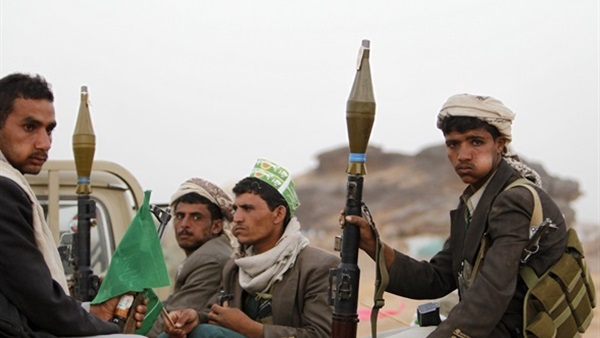Houthis commit mass executions in Saada to eliminate opponents

Without any judicial rulings, the Iran-backed Houthi militia
has relied on executing death sentences against Yemenis on political charges,
without referring to any laws, since their coup against the ruling regime in
September 2014.
Elimination of opponents
During the past few days, the Houthis carried out the death
sentence against 16 detainees from Saada Governorate, which Yemeni Minister of
Information Moammar Al-Eryani described as a mass liquidation of its political
opponents.
He stressed that these death orders are an extension of the
acts of killing and terrorism practiced by the Houthi militia against Yemenis
since its inception in its stronghold, Maran, Saada Governorate, in northern
Yemen.
Iranian method
Eryani likened the practices of the Houthi judiciary to what
is happening in Iran.
He pointed out that the death orders on fabricated charges
following sham trials in illegal courts are a reproduction of the practices of
the mullah regime in Tehran, which continues its campaign of repression and
abuse, issuing and executing death sentences against Iranian youth, girls and
children, who are rising up in all Iranian provinces to demand their natural
right to freedom.
Condemnation
Following the frequent verdicts issued by the militia
against anyone whose loyalty is suspected, Yemenis recently launched a
widespread campaign on social media under the hashtag “Houthis kill the people
of Saada,” recalling the series of executions that the militia carried out
against nine of the sons of Tihama last year on charges of killing militia
leader Saleh al-Samad.
Yemeni activists on social media said that the militia’s
death sentences against dozens of Saada tribesmen are conclusive evidence that
the Houthis are still fighting their battle within the framework of what was
considered their main stronghold and against whom the world thought was their
social incubator.
They referred to the Houthi militia's transformation of its
stronghold, Saada, into a large heinous prison by committing crimes against
civilians.
In a statement, the Yemeni Network for Rights and Freedoms
(a non-governmental human rights coalition) held the Houthis legally
responsible for the lives of the abductees, calling on the international
community to pressure the militia to stop its illegal sentences issued against
32 abductees from Saada Governorate and to release all detainees.
The statement denounced the illegal Houthi verdicts that
sentenced 16 abductees to death and the imprisonment of 13 others from Saada
Governorate, which were based on false and fabricated charges, including
communicating with foreign parties.
Previous death sentences
Since 2017, the militia has issued more than 200 death
sentences in cases of a political nature, in trials that lack the minimum
standards and guarantees for fair trials, in addition to the trials it is
conducting for a large number of civilians before a politicized and unfair
judiciary, according to the Yemeni Network for Rights and Freedoms office in
the capital, Sanaa.
Farce
Yemeni political activist Abdul Hamid Tawfiq described that
what the Houthi militia is doing is nothing but violating laws and public
freedoms. Since 2014, the militia has been deliberately issuing death sentences
unjustly on false charges and without relying on the laws, but rather relying
on its brutality.
He stressed in a special statement to the Reference that
Yemen needs support from the international community to stop this farce.





